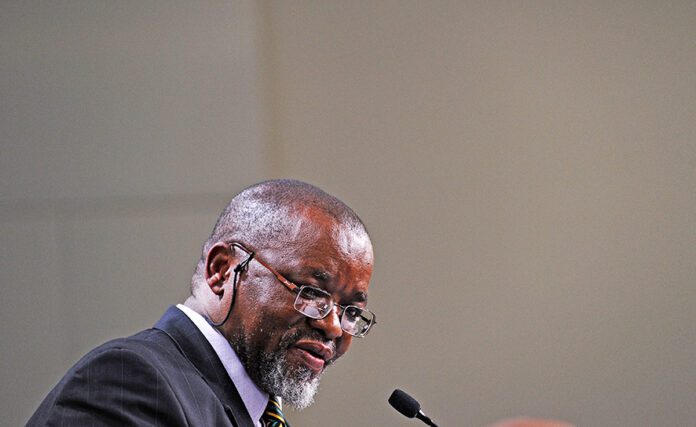ANC national chairperson and Mineral Resources and Energy Minister Gwede Mantashe has survived one of the strongest lobbies in his political life, that of the renewable energy complex calling the shots the world over.
After months of sustained onslaught for insisting that “coal is going to be with us for many years”, Mantashe has had the last laugh.
The proponents of renewable energy tried everything in the book to deal with Mantashe, including sponsoring calls for his head.
And for the longest time, at the level of ANC national leaders, Mantashe was standing alone in defence of coal as another form of energy generation that South Africa should embrace in its energy mix.
This despite President Cyril Ramaphosa having accepted funding from first-world countries pushing for South Africa to move away from coal.
But Mantashe was not barging.
Even Eskom’s former CEO Andre de Ruyter, a renewables foot soldier of note and leading influencer, could not get his way with Mantashe, who pushed back.
Attempted libels and shaming of Mantashe for holding an unpopular energy view were also thwarted.
He instead came to embrace what was meant to be derogatory labels such as referrals to him as a “coal fundamentalist” and “polluter of the year”, among other failed attempts to embarrass him into changing his stance.
Mainstream media was also part of the anti-Mantashe offensive for his coal stance, and the official opposition DA made him its project, and so did various non-government organisations (NGO) within the energy space.
Within the ANC national executive committee (NEC), for the longest time it appeared Mantashe had no allies on his continued views for the use of coal to stay in place.
Or maybe he did but they were silent in fear of being subjected to the attacks visited upon him, non-stop.
Not many have the thick skin in the governing party. Fence-sitting is the order of the day for political expedience and in preservation of the priority seats on the gravy train.
From those that are pro-renewables, the expectation was that the more the attacks on the isolated Mantashe are sustained, at some point he will abandon his pro-coal position and toe the line of the “greenies”, as he calls them.
Little did they know Mantashe was a different one.
He prides himself of not having power, but an ability to “influence political power”. And he has managed to do that with aplomb under two heads of state – Jacob Zuma and Ramaphosa.
His political influence on energy would come to the fore at ANC’s national conference in December 2022.
It was at this conference that Mantashe sponsored a policy proposal that emerged victorious for Eskom to be moved to the Department of Energy that he leads.
But that was always going to be victory in the long-term, for it is not an overnight exercise moving an entity as massive as Eskom from one department to the next.
It looked like Mantashe would have a mountain to climb in his one-man mission to save coal, a natural resource that South Africa is endowed with in abundance.
But he was aware of every maneuver by his opponents and thus equipped about which political moves to make.
“There is a new debate that is ensuing punting the splitting of Department of Mineral Resources and Energy which seeks to appease both sides [pro-renewables and coal proponents],” Mantashe told delegates at the Free State provincial conference in January.
“They will split mining from energy and take Eskom to energy in terms of the resolutions of the conference of the ANC, but then get a greenie [someone pro renewables] to run that energy ministry. That is what they are going to do.”
Something not far from this prediction happened when at State of the Nation Address a few weeks later many believed Mantashe’s ship is sinking when Ramaphosa shocked many, including Mantashe, by announcing a new ministry of electricity that some believed was meant to clip Mantashe’s wings.
But Mantashe’s “influence of political power” saw an opportunity in this development.
Instead of taking a hardline against Electricity Minister Sputla Ramokgopa, and thus isolating him, he saw a potential ally and nursed their relationship.
He confirmed last week at the OR Tambo Memorial Lecture: “I do not know with minister Pravin Gordhan, but we relate well with Sputla [Ramokgopa], we talk regularly and engage on issues.”
This came hot under the heels of an offensive by NGOs at the Africa Energy Indaba.
The protestors interrupted his speech, and the shaming of Mantashe to force a change of heart reached boiling point.
Some of the placards by the rented protestors exclaimed “coal = corruption”, “Gwede stop blocking renewables”, and “coal = loadshedding”.
At that time though, it was clear as daylight that Mantashe was never going to backpedal on his unpopular stance on coal, and he in fact asked for event organisers to let the disruptors voice their discontent with him in the spirit of democracy, where a diversity of views on issues is openly encouraged.
And as fate would have it, the recent ANC NEC meeting took a decision to delay the decommissioning of the coal-fired power stations.
This happened at a gathering whose start Mantashe marked with a daring move of attending the opening of a new coal mine in Mpumalanga.
With that, it was a checkmate move for Mantashe against his determined opponents in the renewables lobby.
The question, however, lingers as to whether Mantashe only emerged a victor in the preliminary battle while the real war is yet to come? Only time will tell.
To read more political news and views, click here.
Follow @SundayWorldZA on Twitter and @sundayworldza on Instagram, or like our Facebook Page, Sunday World, by clicking here for the latest breaking news in South Africa.



